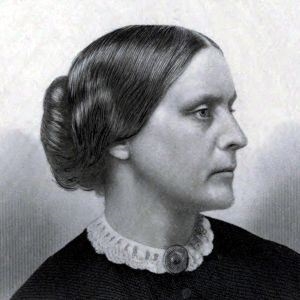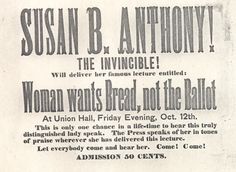 |
| A portrait of Susan B. Anthony. (Biography.com) |
When faced with injustice and inequality, as humans, there are a variety of responses. Most want a change but lack the courage to make one and end up being content with the way things are. Many make a little change like going to a protest or signing a petition, but a select few dedicate their entire lives to undoing the injustice and inequality to make their society better. Susan B. Anthony was one of those select few. Born into a Quaker household, from a young age she was taught about the equal civil rights of all men and women. From these beliefs, she went on to become the president of the National American Woman Suffrage Association (NAWSA). A leader and activist for all women who traveled around the nation delivering speeches wherever she was. She also helped write various books, and edited and published the newspaper, The Revolution. Her efforts did not go unnoticed and in 1979 her portrait was put on the dollar coin. However, the work she did was not easy as many hardships occurred, including social barriers and arrest, and overcoming these obstacles took up her whole life. But her commitment to ending women's suffrage and her ability to break through the social expectations of women proves her to be an inspiration to everyone. Susan B. Anthony was dedicated to ending women's suffrage and her persistence to stand up for what she believed in, despite obstacles thrown in her way, made her a hero.
 |
| Anthony at an old age working with a friend. (history.com) |
Susan B. Anthony dedication to ending women's suffrage resulted in her diverging from the social stereotypes of women in the 1800s, caused her to travel across the nation delivering speeches and even break the law. She was so passionate about her work that she committed her whole life to it, and refused to get married which caused her to break the social standards of women at that time. For example, on the matter of marriage, "'I never felt I could give up my life of freedom to become a man's housekeeper,' she said. '[Marriage] would have meant dropping the work to which I had sent my hand'" (Hill 106). One of the social standards for woman in in the 1800s was getting married and having children. However, because she was so devoted to her work, she did not have time to drop her work and get married. Additionally, because her goal was to end women's suffrage, marrying a man would have gone against her beliefs of women being independent and able to live by themselves. She committed her whole life to breaking women's social standards, which would later open up more opportunities for women. Not only did she give up social normalities for woman at that time, but she also, "... went from meeting to meeting, speech to speech, using her spare moments to plot strategy and fire off letters to her colleagues. This relentless pace continued for most of fifty years" (Hill 106). Anthony tirelessly fought against women's suffrage. Devoted to her work, for more than fifty years she continuously worked hard and never stopped fighting for women's rights. Her last speech was delivered one month before she passed away (Anderson), thus proving how she never stopped fighting to end women's suffrage, and continued fighting until her death. Susan B. Anthony dedication of her whole life to ending women's suffrage to make America a better place, makes her a hero.
 |
| A flier for the trial of Susan B. Anthony. (http://law2.umkc.edu) |
Susan B. Anthony's persistence through social barriers, arrests, and critics proves she is a hero because she let nothing stop her in the way of her goals. In the beginning of her time as an activist, "Anthony was denied a chance to speak at a temperance convention because she was a woman, and later realized no one would take women in politics seriously unless they had the right to vote" ("Susan B. Anthony Biography"). Being denied the right to speak because she was a woman, fueled her passion for women's rights even more. Instead of being content or not taking action after being denied the right to speak, she started to set up her own conferences and spoke there. This shows her persistence because she did not let the people at the temperance conference stop her in her way of speaking about her beliefs. Because they did not take her seriously, she used this experience to create a new goal so her voice would be heard: a woman's right to vote. Then, nineteen years later, "In 1872, Anthony was arrested by the U.S. deputy marshal for voting in the presidential election. She was tried and convicted in 1873, despite her eloquent citation of the 14th Amendment to the Constitution, which guarantees privileges of citizenship to 'all persons born or naturalized in the United States'" (Anderson). Anthony let nothing stop her in the way of her goals, and even got arrested for it. This also shows her persistence because when she got arrested, she got fined, but she did not pay it and continued on with her work. Nothing stopped Anthony's efforts, and even though she broke the law she continued to do what she believed was right. Another example of her persistence is when critics started attacking her on the work she was doing."Anthony's activism and outspoken nature soon made her a target. The Utica Evening Herald, for instance called her 'personally disgusting' and 'a shrewish maiden' in an 1852 article" (Hill 106). While she was trying to end women's suffrage, she was constantly insulted and made fun of for her work. However she did not let what other people said about her affect her and she continued to do what she thought was right, thus proving her persistent. Through social barriers, arrests and critics, Susan B. Anthony continued to be persistent towards ending women's suffrage.
 |
| A flier for one of Anthony's lectures. (National Archives) |
Susan B. Anthony is an inspiration and a hero because she was persistent to stand up for her beliefs and dedicated towards ending women's suffrage. She persisted through social barriers, arrests and critics, and did not let what anyone said about her stop her from reaching her goals. Additionally, she refused to conform to social standards to devote her whole life to end women's suffrage and worked towards her goal until she died. Her dedication and perseverance inspires everyone to stand up for their beliefs and to not let what other people think stop them from reaching their goals. "Susan B. Anthony's persistence, passion and unwavering dedication to her beliefs effected a change in American society that she did not live to see, but her legacy survives in the daily lives of countless women, who, today, have a voice" (Anderson). Because of what Anthony did, women today now have opportunities today like jobs, education and the right to vote. Things that may not have available if it wasn't for Anthony's work. Her work helped shape society into what it is today. She is an inspiration because she shows how if you want a change in the world then you have to get out and work for it, and even if it does not change your life, it will change the lives of other people. Therefore, she inspires everyone to protest against unfairness in society, and to use their voice to positively make a difference. In conclusion, Susan B. Anthony inspires everyone to be one of the select few to stand up against inequality and injustice to make the world a better place.
Works Cited Anderson, Amy. "One woman's voice: Susan B. Anthony inspired a national movement for equality." Success, May 2009, p. 92+. Biography in Context, Hill, Jeff. "Susan B. Anthony (1820-1906)." Women's Suffrage, Omnigraphics, Inc., Detroit, MI, 2006, pp. 105-108. "Susan B. Anthony Biography". The Biography.com website, A&E Television Networks, <http://www.biography.com/people/susan-b-anthony-194905>.
Page created on 2/5/2017 12:00:00 AM
Last edited 2/5/2017 12:00:00 AM
